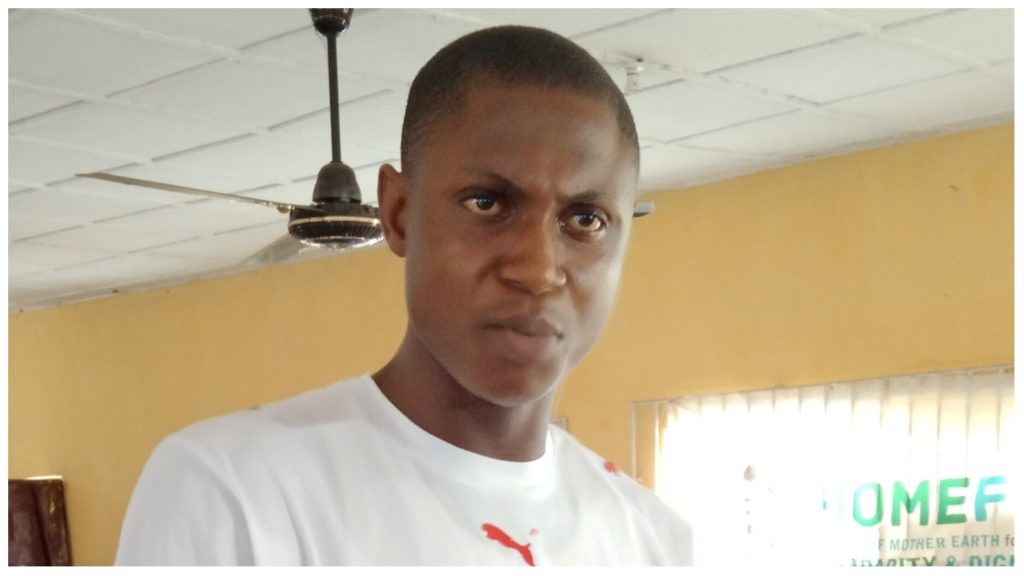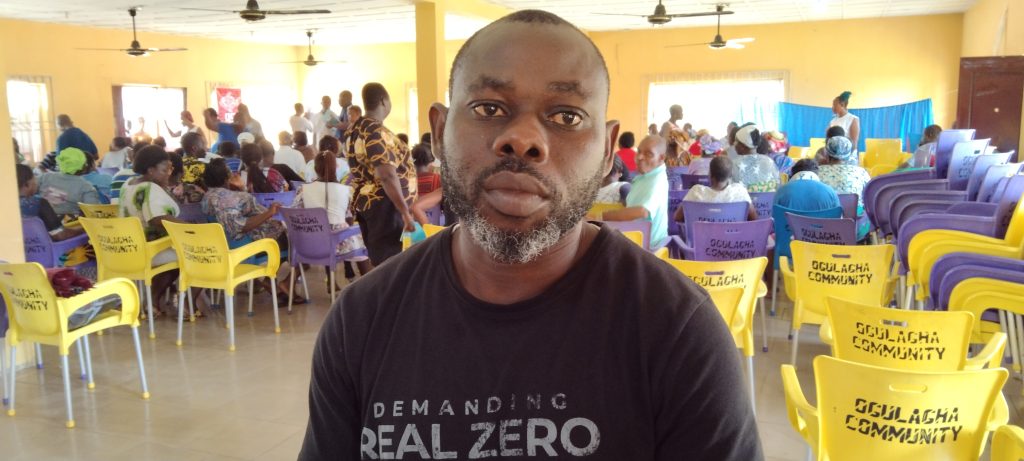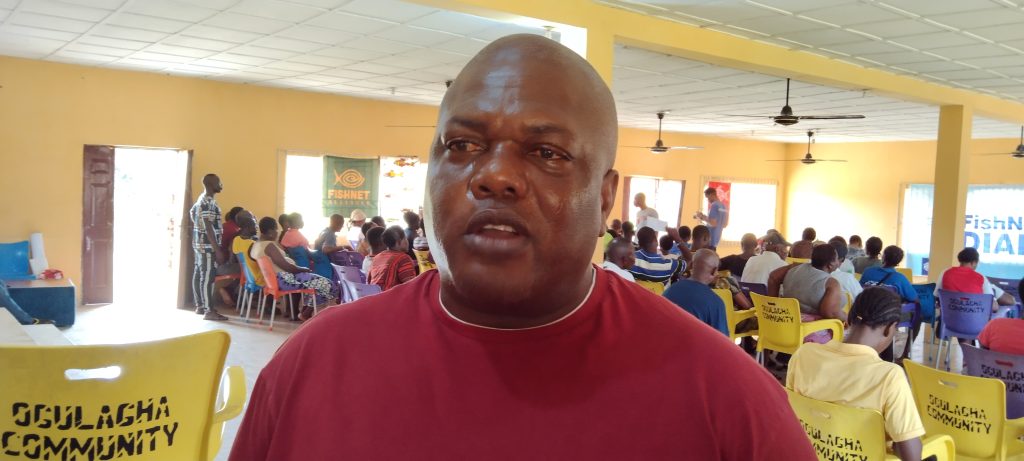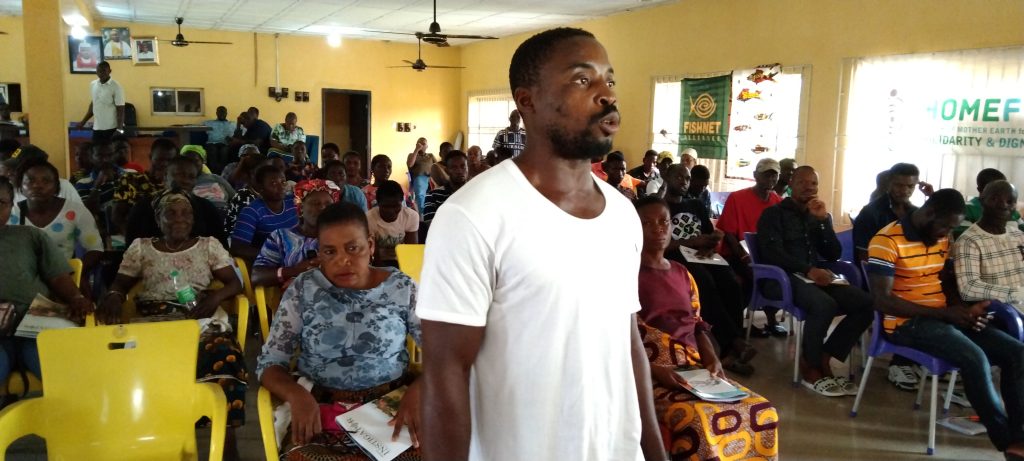COMMUNITY REPORT
Struggle Of Fishing Families In Ogulagha: Their Daily Life In Ocean Of Oil, Garbage Pits

On the coast of the oil-rich Niger Delta, there is a fishing community called Ogulagha. Almost every family in Ogulagha is involved in fishing, and the town is well known for being a fishing port. In Ogulagha, an Ijaw-speaking community in the Burutu Local Government Area of Delta State, fishing is almost everyone’s livelihood.
The life of a fishing family
In Ogulagha, a lot of fishing families make their home near the water, where life is unpredictable and full of adventure. The eventual lack of a government presence leaves the locals with only the regular electricity produced by a turbine provided by nearby multinational oil companies.
Oil is produced in the Ijaw enclave of Ogulagha, which is about 33.3 miles from the main city of Warri and is home to the Shell Petroleum Development Company (SPDC), Nigeria Agip Oil Company (NAOC), and other businesses. A trip to Ogulagha with a 200 horsepower boat would take between 45 and 1 hour, depending on the boat’s speed. Ogulagha, which has a population of about 15,000 people, is home to Ijaw people, who are indigenous to the area, as well as people from Bayelsa State, Ilaje, Ondo State, Urhobo, Hausa, and Yoruba. There are also Ghanaians living there. The region of the Niger Delta is prone to unrest, and this location is also the subject of claims of corruption and unequal distribution of oil windfalls.
Clement Gbamokumor started accompanying his father to fish at the Ogulagha Seaside when he was ten years old. He observed them flip their boat into the water and later that day return with a boatload of fish. He claimed that because the river was still fresh and healthy for the aquatic habitats, his father developed into one of the largest fish merchants in their sleepy community.

Clement
Clement, now 26 years old, recalls with nostalgia how as a child in the predominantly fishing Ijaw community, he was always astounded when his father went out to sea and came home with a huge variety of fish that could feed their family for months and have enough to sell as well as give to neighbors. The pristine sea, which at the time served as the only source of income for the fishermen, gave them a testimony of a rocky harvest, but many years later, the tale is no longer the same. The once-fishy river is now teeming with waste dumps and crude oil. Now, the ocean is a mixture of crude oil, waste dumps, abandoned objects, and dead animals.
Years later, the sea that once provided them with an abundance of fresh, fat fish has started to supply them with smaller fish. Many of his peers who grew up in the same neighborhood as him, enjoying the flora and fauna of the sea environment and what it brings to their parents, could say that life has changed as a result of pollution.
The Future of Fishing in Ogulagha
The rapid decline of fish stocks has made the future of fishing in Ogulagha uncertain. As a result, it was appropriate when the Health of Mother Earth Foundation (HOMEF), a non-governmental organization, decided to host this year’s 2022 World Ocean Day celebration in their coastal community to raise awareness of the importance of ocean conservation. The role that the oceans play in daily life establishes and emphasizes human connections to the sea and raises awareness of how crucial these connections are to the environment’s overall health.
The celebration seemed to be a long-anticipated chance for Gbamokumor and other fishermen who have previously felt abandoned by the government to voice their complaints and share their message with the public. In addition to dealing with waste dumps and oil spills in the ocean, fishermen in Ogulagha frequently experience ocean surge, which washes away local homes and cemeteries. In addition to being attacked by sea pirates, they also struggle to survive because they lack basic necessities like housing, access to a healthcare facility, potable water, and good schools.
‘Before now, once you go into the river bank, you will see fishes swimming in the river, but what you will see when you go to the river now is oil floating,’ Gbamokumor told this reporter who was at the coastal area during the Ocean Day celebration.
“You will see waste dumps and crude oil floating,” he continued, but how have the activities of the oil companies around here affected their means of survival? Because of this, “our ability to survive is constantly in danger, and as a result, we are dying here. You will see various oil wells if you enter the river, but some of them have dated machinery that hasn’t been maintained in years.
In the Agip cluster, for example, there is a point that has been steadily leaking crude for a considerable amount of time. If you go fishing there, you will find fish everywhere, but they are all dead and unfit for consumption. In the past, you would be amazed at what you could pull home if you cast a net into the river. The current state of affairs is having a significant impact on the local farmers and fishermen. The presence of crude oil on my mother’s farm prevents her from farming this season despite the fact that she owns three good farms in the vicinity of Shell. We are pleading with you because we are in danger of dying here. Please help us tell the multinational corporations to stop polluting our rivers,” Gbamokumor laments.
Nnimmo Bassey, director of HOMEF, added his voice to the chorus, saying that this cannot go on because ocean pollution directly endangers humankind and that these corporations must be held accountable for their crimes.
According to him, collective action is required, but Nigeria must first identify the issues and those responsible for them in order for this to be possible. Without first identifying the issues and those in charge of them, Nnimmo is quoted as saying, “We cannot talk about collective actions.”
He went on to say, “It is beyond a shadow of a doubt that industrial fishing, offshore exploration and exploitation, waste disposal offshore, and similar activities are the major contributors to pollution and the devastation of aquatic ecosystems.” If our oceans are healthy, we must also be healthy. Humanity is directly threatened by ocean pollution, and polluters must not be permitted to divest without first making amends for their environmental transgressions,” he continued.
- Seaside of Ogulagha
- Some of the participants
- HOMEF’s Media Communication Lead, Kome Odhomor flanked by journalists at the Ogulagha sea side
Don Tony Temewei, a former vice chairman of the community, believes that the community’s problems with declining fishing output, ocean surge, and erosion began when they were relocated from an island to their current location by multinational corporations.
Another fisherman, Blessing Akassawei, bemoans the pollution of waterways caused by oil company operations. He claims that there used to be a variety of fish species in the ocean, including bonga and ladyfishes, but many of the fish species have now become extinct.
Bassey attributed the low level of fishing activity in the area to the fact that, like many other extractive communities in the Niger Delta, the Ogulagha community is constantly affected by oil spills and waste dumps that endanger not only the aquatic environment.

A cross section of the community people
Currently, in order for fisherfolk to make any good catches, those who own Ghanaian boats, which are reputed to be stronger in build to withstand sea waves, travel farther from the shore and remain at deep sea, sometimes trying desperately all day and all night to make a catch. Because they are afraid of encountering sea pirates, fishermen with their rickety boats, like the locals, avoid the deep sea. Comrade John Bebapere, the chairman of the Ogulagha community, confirmed this by stating that Ogulagha, which used to be the fishing center for foreigners, is dying. He claimed that because of the activities of sea pirates, only foreign nationals, such as Ghanaians, are willing to take the risk of venturing far into the Atlantic Ocean in search of larger fish.
Along with oil spills and waste product dumping in waterways, sea pirate activities have presented a significant obstacle to their fishing expedition. As captured some time ago by the protesting fisherfolk operating under the auspices of Watch Out Fishermen Cooperatives (WOFC), fishermen in the Niger Delta are frequently the targets of sea pirates demanding ransom.
These days, the locals hardly ever venture into the deep ocean out of fear of sea pirates and to avoid wasting gasoline, which they typically obtain from distant Warri. The Ghanaians are the ones that travel great distances to obtain bonga fish. They only use their ferry to travel to locations where they can obtain small catches that they use to feed their families and sell to customers in Warri and Bayelsa State. Our problems are primarily caused by oil exploration activities, but erosion also has an impact on us. We require a shoreline protection project in the town because ocean surge is a significant challenge.
“We are hoping that this program will raise awareness of our plight and encourage the Federal Government to intervene and provide assistance. We need assistance from the federal government, state government, and NDDC. Since we hardly ever see the outside world due to our unusual terrain, Comrade Bebapere said, “We are taking this opportunity to call for assistance by any means possible.”
Despite being one of the richest oil producing communities in the Niger Delta, Bassey expressed sadness over the deplorable state of the town. In a statement to commemorate this year’s World Oceans Day with the theme “Revitalization: Collective Action for the Ocean,” he continued, “The degraded condition of the community is a sad commentary on the despoliation of the Niger Delta and the Gulf of Guinea by oil exploration and exploitation.”
“It is imperative to begin asking hard questions about the perpetrators of the destruction occurring in the oceans, rivers, and creeks. According to Bassey, polluters need to stop what they’re doing, clean up the mess, and pay for the damages they’ve caused.
What effect will the program have now on the fishing community? “It encouraged people to reflect on the state of the oceans, seas, rivers, and creeks, especially for individuals and local communities who have lived in harmony with these water bodies and who need to be recognized, supported, and learned from,” Bassey said.
In support of this, Mr. Cadmus Atake-Enade, Project Lead for HOMEF’s Fossil Politics and Climate Change Initiative, stated that the foundation observed Ocean Day in Ogulagha in order to research how extractive activities affect local residents’ quality of life and develop a policy document for the government.

HOMEF’s Project Lead, Fossil Politics and Climate Change, Mr. Cadmus Atake-Enade
Being a coastal community, “we decided to mark Ocean Day here because we believe it will be significant for the people.” Numerous environmental factors and environmental degradation brought on by natural resource extraction have had an impact on Fisherfork.
In a statement titled “Real Actions for Oceans and Our Wellbeing,” Kome Odhomor, HOMEF’s Media/Communication Lead, added, “And it is necessary for sober reflections on the state of the oceans, seas, rivers, and creeks.” “It is especially important to recognize, support, and draw lessons from individuals and local communities who have lived in harmony with these water bodies,” she said.

HOMEF’s Media Communication Lead, Kome Odhomor at the programme
Conversations with fishermen and locals whose ties to the sea, rivers, and creeks in their area go beyond supporting their livelihoods took place on the Ogulagha community’s banks during HOMEF’s dialogue day. As Odhomor put it, “it is their life.”
Fishermen, including Comrade Bebepere, the Chairman of the Ogulagha community, who thanked the NGO for bringing the program to their area, believe it is past time for the Federal Government to take action against the rise of what is known in the industry as IUU fishing (illegal, unregulated, and unreported fishing), where vessels frequently use ecologically destructive fishing methods, and human rights abuses, which are widespread throughout Ogulagha. This rise was reported by Oceana. He stated, “Foreign vessels frequently encroach upon our territory.”
In an effort to reverse the trend, HOMEF used Ocean Day to launch a FishNet Alliance chapter in the Ogulagha neighborhood. FishNet Alliance is an African fishers’ network. “Fishermen are facing a lot of problems ranging from pollution to low fish catches,” The Alliance’s Stephen Oduware, HOMEF project officer, stated, saying “impacts of climate change and maritime insecurity are actual threats.” It appears that there is a conscious effort being made to remove fishermen from the value chain and equation.

A cross section of the people at the seaside
“The recent plan by the Nigerian government to deploy genetically improved Tilapia fish (GIFT) buttresses this at the national level, while the negotiation text supported by the current WTO chair, which encourages overfishing through fisheries subsidies, reinforces the sorry state at the global level.”
Because artisanal fishers “support the economy and provide employment,” Oduware continued, governments at the national, regional, and continental levels are required to consult fishers on policies that regulate aquatic ecosystems and support them.
Written by Joe Obukata Ogbodu





















